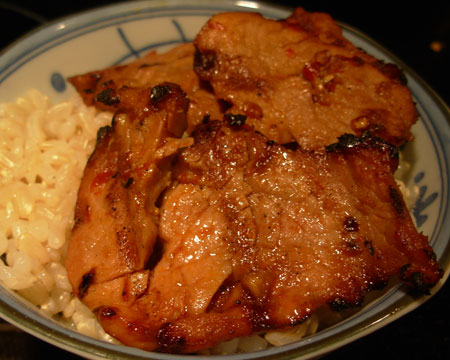My grandparents are not Korean, but I’ll always associate them with Korean food.
Let me explain: There was a Korean grocery store that sold prepared dishes very close to Grandma and Poppa’s house when I was a kid, and every time we went to visit them we’d come home with pa jun (vegetable pancakes), bibimbap (mixed veggies and meat with spicy sauce), kimbap (veggie-and-egg sushi rolls), and japchae (clear glass noodles stir-fried with veggies).
But my favorite dish was bulgogi, paper-thin slices of beef marinated in a sweet-and-spicy sauce. The bulgogi from this place came raw; you had to cook it at home, which took about 12 seconds because the pieces were so thin. The little pieces of meat are so tender they basically fall apart in your mouth, and the flavor is unforgettable—candy-sweet, deeply savory, and fiery hot all at the same time.
Birmingham is certainly not devoid of Korean food—Ginza down 280 is awesome, and there are two mediocre places on Greensprings Highway—but there’s something about preparing it at home that’s special. When I read Wade Kwon’s post on Okra Cola a few weeks ago about his mom’s Korean food, it made me jealous—and brought back those grandparental memories.
So when I saw that Serious Eats posted a bulgogi recipe on Thursday, I had to try it. And it tasted just like the bulgogi of my youth.
This recipe is for daeji bulgogi, which means it uses pork instead of beef, but you could use the exact same recipe with beef, chicken, lamb, shrimp, squid, maybe even tofu (though I can’t vouch for that). The key is to slice the meat into very thin pieces that are still large enough to grill.
All the ingredients except for gochujang can be found at any supermarket. Gochujang is a fermented chile paste you can find at Asian markets. I used Chinese hot bean paste, a similar ingredient I happened to have on hand; you could also use sambal or sriracha, which are reasonably close in flavor.
You want the grill really hot so you get some nice caramelization on the meat. You could also cook this in a pan or wok, but if you do make sure it’s well heated over a high flame before you get started.
Serious Eats recommends wrapping the bulgogi in lettuce leaves with pickles and kimchi, but a bowl of rice makes for a better meal. If you have a few cucumbers on hand, a quick Asian-style pickle is easy and a nice companion: Slice the cukes thinly (you can peel if you want; I don’t think it’s necessary), put them in a bowl, and sprinkle with salt (maybe 1/2 teaspoon per medium cucumber). Mix with your hands for a minute or two until some liquid starts to come out, drain, and drop in a bowl with a mixture of one part rice vinegar and two parts water. In about an hour, you’ve got pickles. Start the pickles right before or after you start the meat marinating, and you’re all set.

We enjoyed this meal with Jason the other night, and I have to say, it was very, very good!
everyone has to try it, you will be pleasantly surprised.
Another reason to come back to Chicago!!